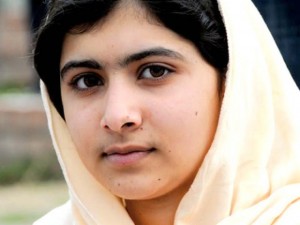UPDATED: Members of the Norwegian Nobel Committee have been huddling inside the Nobel Institute in Oslo to choose this year’s winner of the Nobel Peace Prize, with their last meeting scheduled for Friday. Two of Oslo’s foremost monitors of the prize believe the committee has already made its decision, and the teenaged girl who defied the Taliban and got shot in the process tops both their lists of likely winners.

“It’s always a difficult act to speculate on the Peace Prize,” Kristian Berg Harpviken, director of the Oslo-based peace research institute PRIO, told foreign correspondents in Oslo on Thursday. “But I’ve placed Malala Yousafzai at the top, for a number of reasons.”
So has author and historian Asle Sveen, who’s an expert on the Nobel Peace Prize and runs the website Nobeliana (external link) along with fellow scholars Ivar Libæk and Øivind Stenersen. They think Malala Yousafzai’s candidacy for the Nobel Peace Prize has strengthened considerably since she was first nominated earlier this year.
Sveen and Harpviken agree that the girl known mostly as “Malala” has emerged as an international heroine and special role model for girls, after her courageous efforts to ensure their rights to education so riled the Taliban that they tried, and failed, to assassinate her last year. After recovering from gunshot wounds to the head and neck, she has carried on her efforts for girls’ education and peaceful reforms, and delivered an impressive speech at the United Nations this past summer.

Her age, just 16, is nonetheless “a problem,” according to both Sveen and Harpviken, because winning the Peace Prize can become a major burden for someone so young. The committee, they caution, may opt to shield her from the pressure of winning the prize, but she’s still “highly probable” as a winner, Sveen said.
Thorbjørn Jagland, chairman of the Nobel Committee, told newspaper Aftenposten on Friday that age and gender are not among the criteria they consider. He would not comment directly on Malala Yousafzai’s candidacy.
Harpviken thinks a prize to Malala would also likely be “better understood” than several of the most recent prizes, referring to the controversy that erupted over prizes to the European Union (EU), for example, and US President Barack Obama. Jagland claimed that potential controversy doesn’t play a role in the choices made by the committee, which he says only makes sure the winner was nominated before the deadline of February 1 and fulfills the criteria laid out in prize benefactor Alfred Nobel’s will. Critics, meanwhile, have repeatedly questioned the committee’s interpretation of that will.
Many more candidates
There are 258 other candidates for this year’s prize, including 50 organizations. Since the prize was awarded to an organization (the EU) last year, though, Harpviken thinks it’s unlikely the committee will choose an organization again. Both he and Sveen also see Russian human rights activist Ludmilla Alexeyeva of the Helsinki Group as a likely winner, with Harpviken also highlighting her colleagues Svetlana Gannushkina of Memorial and Lilya Shibanova of Golos as top candidates for the Peace Prize.
Both also named the Congolese gynecologist Denis Mukwege, who has aided victims of sexual violence in Congo and was the target of an assassination attempt himself last year. Mukwege has been nominated before and singled out by the New York Times as a worthy candidate for the Nobel Peace Prize.
Harpviken, though, put Sister Mary Tarcisia Lokot ahead of Mukwege on his list, for her work for peace and reconciliation in Northern Uganda. Fourth on his list was Claudia Paz y Paz, attorney general in Guatemala, for leading efforts to charge former Guatemalan President General Rios Montt with genocide. No one from Central or South America has won a Nobel Peace Prize since 1992, and it may be time. but neither Sveen nor Harpviken think peace talks between the Colombian government and FARC officials have come far enough for them to be top candidates.
Sveen noted that history proves that “a Norwegian connection” is important in the selection of winners, with many of those winning because of nominations by elected Norwegian officials. Many of their top candidates have such connections, including Mukwege, who was nominated by former government minister Audun Lysbakken and was in Norway this past summer.
Critics keep challenging choices
Criticism of the Nobel Peace Prize continues to swirl, meanwhile, among those who feel the prize has strayed too far from the intentions of benefactor Alfred Nobel’s will, which highlighted reduction of armies, international peace congresses and disarmament as key criteria in selecting winners. Others feel those criteria are outdated and that the Nobel Peace Prize has evolved with the times. The Norwegian Nobel Committee “has thought long and hard,” Harpviken noted, about what creates peace, and firmly believes there can be no peace without respect for fundamental human rights.
Sveen said controversy and debate around the Peace Prize is nothing new and neither he nor Harpviken see a need for the prize to “redeem itself,” as some critics have suggested. They agree the prize can be viewed as political, and that it’s “a prize promoting western values.” This year’s announcement will be made at 11am on Friday October 11.
newsinenglish.no/Nina Berglund

